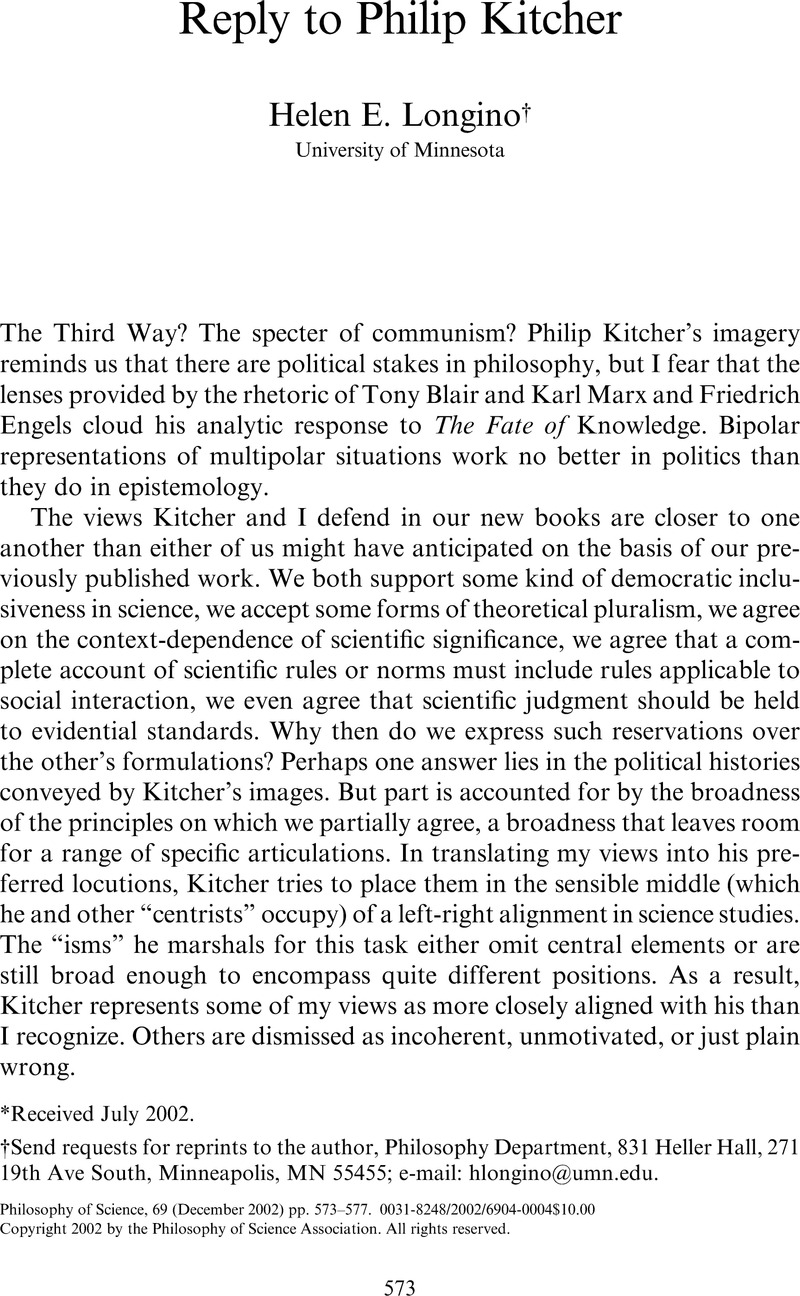Crossref Citations
This article has been cited by the following publications. This list is generated based on data provided by
Crossref.
Longino, Helen E.
2006.
Cambridge and Vienna.
Vol. 12,
Issue. ,
p.
167.
Biddle, Justin
2007.
Lessons from the Vioxx Debacle: What the Privatization of Science Can Teach Us About Social Epistemology.
Social Epistemology,
Vol. 21,
Issue. 1,
p.
21.
Peter, Fabienne
2008.
Pure Epistemic Proceduralism.
Episteme,
Vol. 5,
Issue. 1,
p.
33.
Schmaus, Warren
2008.
A New Way of Thinking about Social Location in Science.
Science & Education,
Vol. 17,
Issue. 10,
p.
1127.
Solomon, Stephanie
2009.
The Social Sciences and Democracy.
p.
39.
Freedman, Karyn L.
2009.
Diversity and the Fate of Objectivity.
Social Epistemology,
Vol. 23,
Issue. 1,
p.
45.
Van Bouwel, Jeroen
2009.
The Social Sciences and Democracy.
p.
121.
Richardson, Sarah S.
2010.
Feminist philosophy of science: history, contributions, and challenges.
Synthese,
Vol. 177,
Issue. 3,
p.
337.
De Langhe, R.
and
Greiff, M.
2010.
Standards and the distribution of cognitive labour: A model of the dynamics of scientific activity.
Logic Journal of IGPL,
Vol. 18,
Issue. 2,
p.
278.
Borgerson, Kirstin
2011.
Amending and defending Critical Contextual Empiricism.
European Journal for Philosophy of Science,
Vol. 1,
Issue. 3,
p.
435.
Van Bouwel, Jeroen
2012.
Drunk on Capitalism. An Interdisciplinary Reflection on Market Economy, Art and Science.
p.
35.
Gómez, Amparo
2015.
New Perspectives on Technology, Values, and Ethics.
Vol. 315,
Issue. ,
p.
105.
López Cerezo, José Antonio
2015.
Social Objectivity Under Scrutiny in the Pasteur–Pouchet Debate.
Journal for General Philosophy of Science,
Vol. 46,
Issue. 2,
p.
301.
Van Bouwel, Jeroen
2015.
Towards Democratic Models of Science: Exploring the Case of Scientific Pluralism.
Perspectives on Science,
Vol. 23,
Issue. 2,
p.
149.
Koskinen, Inkeri
and
Mäki, Uskali
2016.
Extra-academic transdisciplinarity and scientific pluralism: what might they learn from one another?.
European Journal for Philosophy of Science,
Vol. 6,
Issue. 3,
p.
419.
Breitenbach, Angela
and
Choi, Yoon
2017.
Pluralism and the Unity of Science.
The Monist,
Vol. 100,
Issue. 3,
p.
391.
Sikka, Tina
2019.
Climate Technology, Gender, and Justice.
p.
45.
Sikka, Tina
2019.
Climate Technology, Gender, and Justice.
p.
127.
Bruner, Justin P.
and
Holman, Bennett
2019.
Self-correction in science: Meta-analysis, bias and social structure.
Studies in History and Philosophy of Science Part A,
Vol. 78,
Issue. ,
p.
93.
Sikka, Tina
2019.
Climate Technology, Gender, and Justice.
p.
113.





